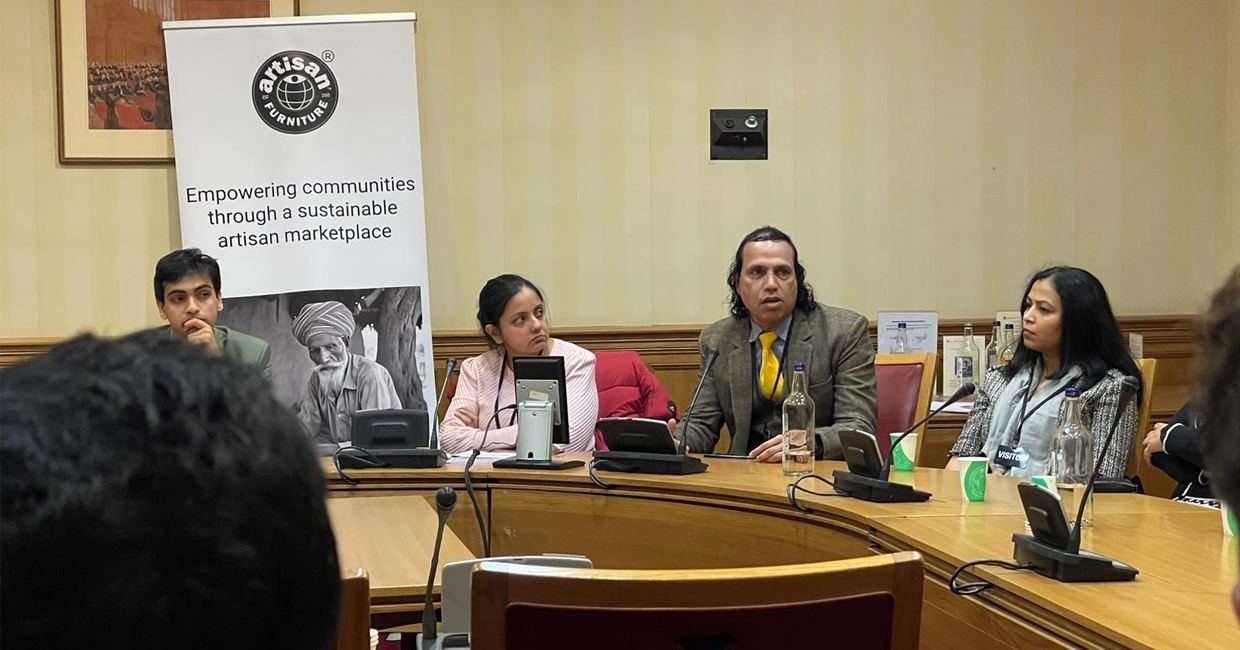In October, Furniture News’ Paul Farley attended a roundtable at the House of Lords, convened by Artisan Furniture. The discussion centred on sustainable supply chains – and, given Artisan’s role as a furniture importer, trade between India and the UK in particular.
Artisan Furniture is one of the UK’s largest sustainable furniture and homeware enterprises. A dropship and wholesale supplier headquartered in Westminster, Artisan (the trading name of Global Vision Direct) has its own production plant in Jaipur, from which it channels significant volumes of cabinet furniture, upholstery and accessories to a range of UK clients.
Artisan’s model is unique, in that the business also works with a network of craftspeople in India to develop handmade products – and its sustainable and ethical approach saw it achieve B Corp certification this year.
The roundtable was an example of Artisan’s collaborations with the likes of Oxford University, Goldman Sachs and Harvard Business School, as the business seeks to encourage the development of sustainable strategies that can be implemented by SMEs, and beyond.
“The roundtable convened industry leaders, parliamentarians and experts to deliberate on the importance and challenges of sustainable supply chains, “ says Jack Basu, the son of Artisan’s founder Amit, the business’ head of community and content, who convened and chaired the roundtable.
Participants included representatives from the All-Party Parliamentary Group (Trade and Investment) India, sustainability advocates and academics from the 1928 Institute and British Foreign Policy Group, market intelligence specialist (and roundtable sponsor) Sibylline, and Artisan’s fulfilment partner, DHL.
The discussion was wide-reaching and insightful, covering the push for renewables, sustainable logistics strategies, greenwashing, supply chain accountability and green incentives – and the myriad challenges involved.
“The debate spotlighted the complexities in formulating universally acceptable standards, especially with variances in carbon emission measurements,” says Jack, “while the challenge of ensuring genuine green credentials amidst the clamour for sustainability was evident.”
Other barriers cited were the economic realities of developing regions, a generational gap in attitudes towards ESG values, and the challenge of balancing globalisation and localisation.
Feedback pointed to the need for greater R&D, collaboration, education and financial support, yet the room was divided as to whether sustainable supply chain strategy should come from the top, or from the world of private enterprise.
“A prevailing issue was the role of governments in crafting guidelines, while companies shoulder the responsibility of tailoring and implementing them,” says Jack.
Solutions, too, were put forward, including industry-specific sustainability benchmarks, encouragement of public/private partnerships, the implementation of a centralised sustainable supply chain database, cross-border regulatory alignment, financial instruments for sustainability (bonds and loans), and the possibility of localised solutions with global oversight.
“The feasibility of universal global guidelines emerged as a contentious topic,” Jack explains. “While the roundtable elucidated the central challenges and prospects surrounding sustainable supply chains, the journey ahead mandates a symbiotic alliance, inventive approaches, and an unwavering dedication to global wellbeing.”




